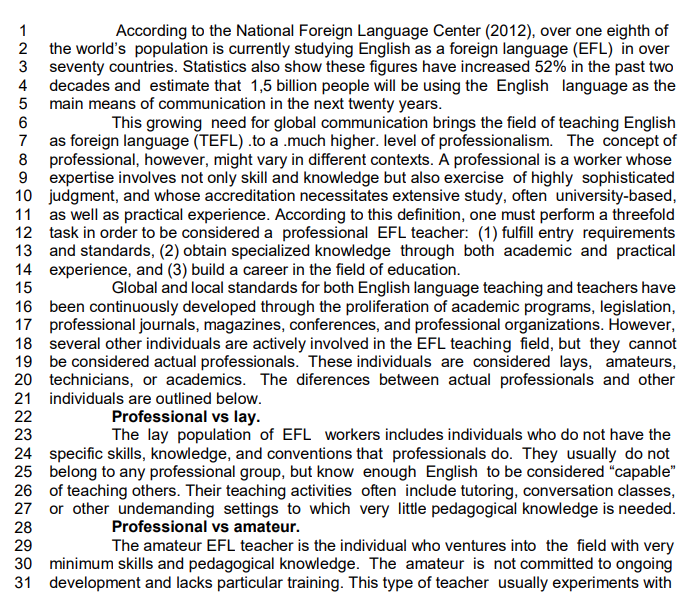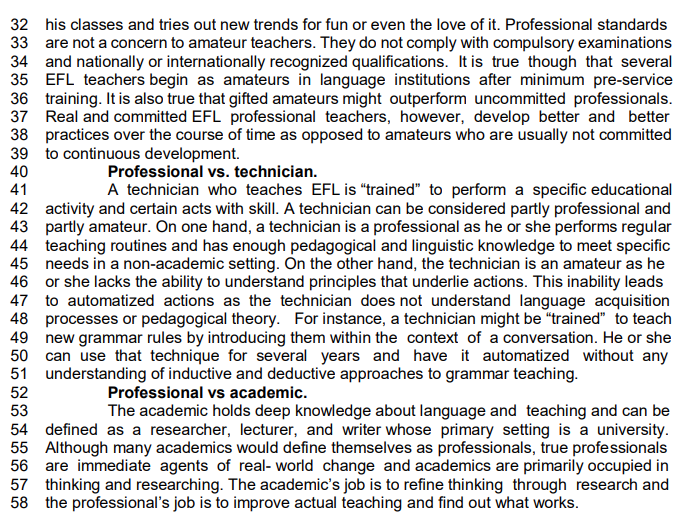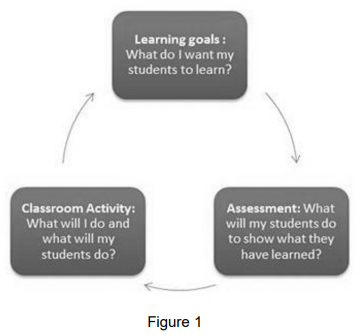Questões de Concurso
Sobre pronome relativo | relative clauses em inglês
Foram encontradas 151 questões
“The teacher praised the student ____ project on environmental conservation won first prize.”
Read the text below and answer the questions that follow.
Text
Should schools just say no to pupils using phones?
14th July 2024
Natalie Grice – BBC News
“I wouldn’t say it’s a good thing for a child never to have a smartphone. I think it’s part of a balanced life. You’ve got to live in your own time.”
These are not the words you might expect to hear from a teacher at a school that has never in its history allowed pupils under sixth form age to use a mobile phone on the premises.
But Sarah Owen, deputy head at Stanwell School in Penarth, Vale of Glamorgan, was simply expressing a personal opinion, rather than the school’s view about a young person’s wider life.
It is clear that she and the school have very firm opinions on what is best for children while they are on school grounds.
For Stanwell pupils in years 7 to 11, that has always meant no phones. Not in lessons, not in the corridor, not at breaktimes.
It is such a long-established rule that it presumably comes as no surprise to pupils and parents when they join the school, which is starting to seem as if it may have been ahead of a growing curve.
In the past few years, a number of schools across Wales and further afield have introduced total bans on mobiles. While Stanwell only asks pupils to keep phones switched off in their bags, others require the devices to be handed in at the start of the day.
Llanidloes High School in Powys is one which has implemented this policy in the past few years and Ysgol Penrhyn Dewi in St Davids, Pembrokeshire, followed suit at the start of this year.
Sarah Owen has been at Stanwell School since 2000 and says that there has always been a no phone policy in the school. For Sarah, it is a question not of trying to impinge on their students’ freedom, but of giving them vital time away from mobile life, for welfare as well as educational reasons.
“We genuinely believe this is in their best interests,” she said. “Phone addiction and screen addiction and scrolling, the loss of concentration, the loss of soft skills around listening and interacting with others, that’s something we need to be concerned about as a society generally.”
“We want children to be interacting with each other, having conversations, playing football, having those connections and interactions with other people.”
Sarah also believes it gives pupils relief from the possibility of being “photographed, filmed, mocked in some way – that’s not a nice way for children to live”. She said she wanted her pupils to have “some sanctuary from the anxiety of feeling so scrutinised and looked at”.
Adapted from: https://www.bbc.com/news/articles
Mark the CORRECT item to fill in the blank.
The director, ______ film won several awards, will be speaking at the conference.

Choose the correct option to fill in the blanks with “who,” “whom,” or “whose.”
1 - The man car ____was parked outside the office came in to ask about the meeting.
2 - The teacher ___you spoke to is on vacation.
3 - I have a colleague____ knows a lot about modern art.
4 - The musician_____ song won the award is very talented.
5 - The participants_____ answers were correct received certificates.

Tom Gauld. The narrator. Internet: <theguardian.com>.
According to the previous comic strip, judge the items that follow.
There are two relative clauses in the last panel of the comic strip.
Four types of English exist in Africa, identifiable in terms of history, functions, and linguistic characteristics. West African Pidgin English has a history going back to the 15th century, 400 years before formal colonization. Creole varieties of English have a history going back to repatriation of enslaved people from the Caribbean and the United States of America in the 19th century. Second language varieties, which are the most widespread on the continent, are prototypically associated with British colonization and its education systems. L1 (first language) English occurred mostly in Southern and East Africa and is best represented in South Africa. The latter shows significant similarities with the other major Southern Hemisphere varieties of English, spoken in Australia and New Zealand.
African Englishes From a Sociolinguistic Perspective.
Internet: <oxfordre.com> (adapted).
Considering the previous text, its ideas and linguistic features, as well as the reading strategies that apply to it, judge the following item.
In the last sentence of the text, “The latter” is a noun phrase that refers to “South Africa”.
The official journal of the IFIP Technical Committee on Education covers the complex relationships that are established between information and communication technologies and education. Especially those providing perspectives at all levels which range from the micro of specific applications or instances of use in classrooms to macro concerns of national policies and major projects; from classes of five year olds to adults in tertiary institutions; from teachers and administrators, to researchers and designers; from institutions to open, distance and lifelong learning. This breadth of coverage allows Education and Information Technologies to examine fundamental issues at all levels that discuss specific instances and cases, drawing inference and probing theory. This journal is embedded in the research and practice of professionals who look for boosting their performances by bringing in innovation. We are also very proud to acknowledge that over 50% of the articles published in this journal in 2023 were related to one or more of the 17 Sustainable Development Goals (SDGs).
(Available in: https://link.springer.com/journal/10639. Adapted.)
Indique a opção que complete corretamente a frase, usando uma relative clause.
I have a friend __________ father is an architect and __________ works in the same company as me.
Text
Reading skill will help you to improve your understanding of the language and build your vocabulary.
Read the text below carefully.
Social media, magazines and shop windows bombard people daily with things to buy, and British consumers are buying more clothes and shoes than ever before. Online shopping means it is easy for customers to buy without thinking, while major brands offer such cheap clothes that they can be treated like disposable items – worn two or three times and then thrown away
In Britain, the average person spends more than £1,000 on new clothes a year, which is around four per cent of their income. That might not sound like much, but that figure hides two far more worrying trends for society and for the environment. First, a lot of that consumer spending is via credit cards. British people currently owe approximately £670 per adult to credit card companies. That’s 66 per cent of the average wardrobe budget. Also, not only are people spending money they don’t have, they’re using it to buy things they don’t need. Britain throws away 300,000 tons of clothing a year, most of which goes into landfill sites.
People might not realize they are part of the disposable clothing problem because they donate their unwanted clothes to charities. But charity shops can’t sell all those unwanted clothes. Fast fashion goes out of fashion as quickly as it came in and is often too poor quality to recycle; people don’t want to buy it second-hand. Huge quantities end up being thrown away, and a lot of clothes that charities can’t sell are sent abroad, causing even more economic and environmental problems.
However, a different trend is springing up in opposition to consumerism – the ‘buy nothing’ trend. The idea originated in Canada in the early 1990s and then moved to the US, where it became a rejection of the overspending and overconsumption of Black Friday and Cyber Monday during Thanksgiving weekend. On Buy Nothing Day people organize various types of protests and cut up their credit cards. Throughout the year, Buy Nothing groups organize the exchange and repair of items they already own.
The trend has now reached influencers on social media who usually share posts of clothing and make- -up that they recommend for people to buy. Some YouTube stars now encourage their viewers not to buy anything at all for periods as long as a year. Two friends in Canada spent a year working towards buying only food. For the first three months they learned how to live without buying electrical goods, clothes or things for the house. For the next stage, they gave up services, for example haircuts, eating out at restaurants or buying petrol for their cars. In one year, they’d saved $55,000.
The changes they made meant two fewer cars on the roads, a reduction in plastic and paper packaging and a positive impact on the environment from all the energy saved. If everyone followed a similar plan, the results would be impressive. But even if you can’t manage a full year without going shopping, you can participate in the anti-consumerist movement by refusing to buy things you don’t need. Buy Nothing groups send a clear message to companies that people are no longer willing to accept the environmental and human cost of overconsumption.
source: learnenglish.britishcouncil.org
Read the sentences below and determine whether they are true ( T ) or false ( F ), according to structure and grammar use.
( ) The verbs worn and thrown (1st paragraph of the text) has its infinitive form as wear and throw.
( ) The underlined words in the text: nothing, anything and, everyone are examples of relative pronouns.
( ) The singular form of the following words from the text clothes and goods are, respectively cloth and good.
( ) The following sentence from the text: “Fast fashion goes out of fashion as quickly as it came in …” (3rd paragraph of the text). The words in bold are being used to compare things that are equal in some way.
( ) The negative form of the sentence “In one year, they’d saved $55,000.” (5th paragraph of the text), is “In one year, they hadn’t saved $55,000.”
Select the option that presents the correct sequence from top to bottom.
TEXT 1
Why is music good for the brain?
October 7, 2020
By Andrew E. Budson, MD, Editorial Advisory Board Member, Harvard Health Publishing

1. Can music really affect your well-being, learning, cognitive function, quality of life, and even happiness? Hand in a recent survey on music and brain health conducted by AARP revealed some interesting findings about the impact of music on cognitive and emotional well-being: music listeners had higher scores for mental well-being and slightly reduced levels of anxiety and depression compared to people overall.
2. Of survey respondents who currently go to musical performances, 69% rated their brain health as “excellent” or “very good,” compared to 58% for those who went in the past and 52% for those who never attended. Of those who reported often being exposed to music as a child, 68% rated their ability to learn new things as “excellent” or “very good,” compared to 50% of those who were not exposed to music.
3. Active musical engagement, including those over age 50, was associated with higher rates of happiness and good cognitive function. Adults with no early music exposure but who currently engage in some music appreciation show above average mental well-being scores. Those are pretty impressive results, to be sure. However, this 20-minute online survey has some limitations. For one, it included 3,185 US adults ages 18 and older; that is a small number if you are extrapolating to 328 million people across the country. For another, it is really a survey of people’s opinions. For example, although people might report their brain health as “excellent,” there was no objective measure of brain health such as an MRI scan, or even a test to measure their cognition.
4. Lastly, even if the ratings were true, the findings are only correlations. They do not prove that, for example, it was the exposure to music as a child that led to one’s improved ability to learn new things. It may be equally likely that those children brought up in more affluent households were both more likely to be exposed to music and to be given a good education that led to their being able to easily learn new things later in life.
5. Music has been shown to activate some of the broadest and most diverse networks of the brain. Of course, music activates the auditory cortex in the temporal lobes close to your ears, but that’s just the beginning. The parts of the brain involved in emotion are not only activated during emotional music, they are also synchronized. Music also activates a variety of memory regions. And, interestingly, music activates the motor system. In fact, it has been theorized that it is the activation of the brain’s motor system that allows us to pick out the beat of the music even before we start tapping our foot to it!
6. Okay, get along! so music activates just about all of the brain. Why is that so important? Well, have you ever heard the expression, “If you don’t use it, you’ll lose it”? It turns out this is actually true in the brain. Brain pathways — and even whole networks — are strengthened when they are used and are weakened when they are not used. The reason is that the brain is efficient; it isn’t going to bother keeping a brain pathway strong when it hasn’t been used in many years. The brain will use the neurons in that pathway for something else. These types of changes should be intuitively obvious to you — that’s why it is harder to speak that foreign language if you haven’t used it in 20 years; many of the old pathways have degraded and the neurons are being used for other purposes.
BUDSON, Andrew E. Why is music good for the brain? Harvard Health Publishing, 7 out. 2020. Disponível em:
“The professional of Teaching English as a Foreign Language”
Author: Anderson Francisco Guimarães Maia


I. The article is about different ways to perform as a professional EFL teacher.
II. The word “whose” in line 10 refers to “worker” in the same sentence.
III. The words “requirements” (line 12) and “standards” (line 13) are synonyms.
IV. The article is predominantly denotative.
The following statement(s) is/are true
Read the text III to answer the question.
TEXT III
A new report into world education shows Finland has the best system. The global study is called "The Learning Curve" and is from the British magazine "The Economist". It aims to help governments provide a better education to students. The 52-page report looked at the education system in 50 countries. Researchers analysed millions of statistics on exam grades, literacy rates, attendance, and university graduation rates. Asia did well in the report, with South Korea, Hong Kong, Japan and Singapore finishing second, third, fourth and fifth. The United States came 17th in the study, while Mexico, Brazil and Indonesia filled the bottom three positions in the top 50.
The Learning Curve reported on five things that education leaders should remember. The first is that spending lots of money on schools and teachers does not always mean students will learn. Second is that "good teachers are essential to high-quality education". The report said teachers should be "treated as the valuable professionals they are, not as technicians in a huge, educational machine". Numbers three and four are that a country's culture must have a strong focus on the importance of education, and parents have a key part to play. Finally, countries need to "educate for the future, not just the present." The report said: "Many of today's job titles…simply did not exist 20 years ago."
Sources:
http://www.timeshighereducation.co.uk/story.asp?sectioncode=26&storycode=421944&c=1
http://thelearningcurve.pearson.com/content/download/bankname/components/filename/FINAL%20LearningCurve_Final.pdf
3
Empowering language learning through assessment

Assessment of, as, and for learning
